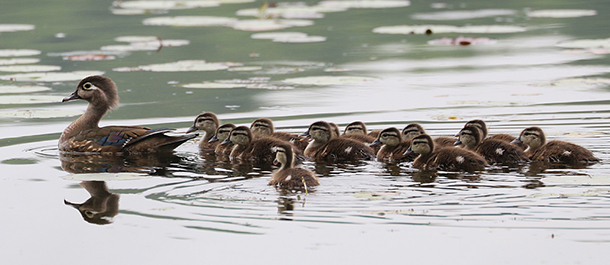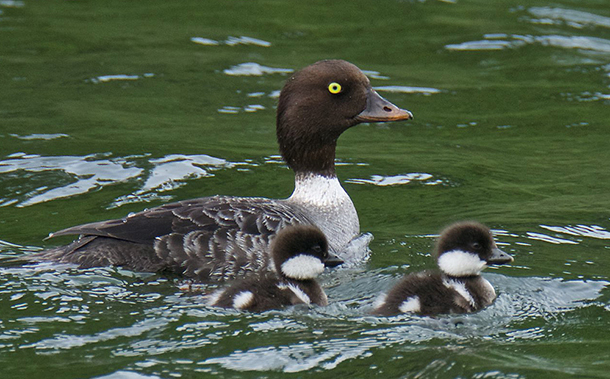BirdNote: Just Whose Ducklings Are Those?
Air Date: Week of May 12, 2017

A female Wood Duck’s young may not all be her own, thanks to nest parasitism. (Photo: Curtis, Creative Commons)
Wood Ducks avoid putting all their eggs in one basket – literally, by laying some of them in other ducks’ nests as an insurance policy in case disaster strikes their own nests. BirdNote’s Mary McCann explains that the duck that ends up with extra ducklings may not always be able to tell when she’s caring for alien brood.
Transcript
[MUX - BIRDNOTE® THEME]
CURWOOD: Beside ponds, rivers, and in marsh-land, water-fowl are starting to take their first expeditions away from their nests, their gaggle of fluffy offspring tagging behind. But as Mary McCann explains, when it comes to Wood Ducks, what you see might not be what you imagine.
http://birdnote.org/show/just-whose-ducklings-are-those
BirdNote®
Just Whose Ducklings Are Those?
[Juvenile Wood Duck call, http://macaulaylibrary.org/audio/179353, 0.09-.13]
As a female Wood Duck swims across a pond with a dozen little ducklings in tow, we see her as a good mother looking after her brood. Well, it turns out that some of the youngsters might not be her own.
Wood Ducks nest in tree cavities or nest-boxes, and it’s well known that they’ll sometimes lay some of their eggs in other ducks’ nests. They’ll even lay eggs in the nests of other kinds of ducks, like Hooded Mergansers and Goldeneyes.

Goldeneye ducks are sometimes unwitting foster parents to the young of sneaky, egg-dumping Wood Duck females. (Photo: Gregg Thompson)
Biologists call this nest parasitism, or egg dumping. It may be a kind of adaptive insurance against the loss of a nesting female’s own eggs or brood – you don’t want to have all your eggs in one basket, after all.
But can a female duck tell when another duck’s eggs have been added to her nest? Perhaps, sometimes. Hooded Mergansers are frequent recipients of eggs from other species. And sometimes, they’ll push the alien eggs to the outer edge of their own clutch, or dump them right out of the nest.
[Female Hooded Merganser call, http://macaulaylibrary.org/audio/163898, 0.19-.22]
But not always.
So back to that brood of a dozen little ones we saw crossing the pond. It’s a good bet that the mother duck has at least one – and maybe more – foster ducklings in tow.
[Juvenile Wood Duck call, http://macaulaylibrary.org/audio/179353, 0.09-.13]
###
Written by Bob Sundstrom
Bird sounds provided by The Macaulay Library of Natural Sounds at the Cornell Lab of Ornithology, Ithaca, New York. 179353 recorded by Logan Kahle and 163898 recorded by Steve N. G Howell.
Producer: John Kessler
Executive Producer: Sallie Bodie
© 2017 Tune In to Nature.org May 2017 Narrator: Mary McCann
[primary information source: Birds of North America Online]
http://birdnote.org/show/just-whose-ducklings-are-those
CURWOOD: For photos of Wood ducks and ducklings, paddle on over to our website LOE.org.
Links
Listen on the BirdNote website
More about Wood Ducks from the Cornell Lab of Ornithology’s All About Birds
Living on Earth wants to hear from you!
Living on Earth
62 Calef Highway, Suite 212
Lee, NH 03861
Telephone: 617-287-4121
E-mail: comments@loe.org
Newsletter [Click here]
Donate to Living on Earth!
Living on Earth is an independent media program and relies entirely on contributions from listeners and institutions supporting public service. Please donate now to preserve an independent environmental voice.
NewsletterLiving on Earth offers a weekly delivery of the show's rundown to your mailbox. Sign up for our newsletter today!
 Sailors For The Sea: Be the change you want to sea.
Sailors For The Sea: Be the change you want to sea.
 The Grantham Foundation for the Protection of the Environment: Committed to protecting and improving the health of the global environment.
The Grantham Foundation for the Protection of the Environment: Committed to protecting and improving the health of the global environment.
 Contribute to Living on Earth and receive, as our gift to you, an archival print of one of Mark Seth Lender's extraordinary wildlife photographs. Follow the link to see Mark's current collection of photographs.
Contribute to Living on Earth and receive, as our gift to you, an archival print of one of Mark Seth Lender's extraordinary wildlife photographs. Follow the link to see Mark's current collection of photographs.
 Buy a signed copy of Mark Seth Lender's book Smeagull the Seagull & support Living on Earth
Buy a signed copy of Mark Seth Lender's book Smeagull the Seagull & support Living on Earth

